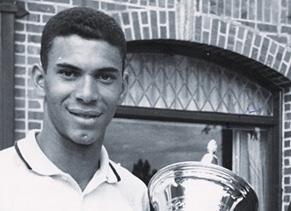
4 minute read
We Need More of The "Wright" Stuff
Black Lives Matter — here, there and everywhere
By Dick Stephens
Cascade Golfer is not seen as a traditional “hard news” publication, nor should it be. It’s a place where you can kick back and learn about our region’s golfing gab and scoop. Since the beginning — 13 years ago this summer — we have been committed to our slogan: “Northwest Golf News and Views You Can Use.” (I am proud to say that I coined that one.)
As evidenced by us humbly picking up another first-place prize in the Society of Professional Journalists’ annual “Northwest Excellence in Journalism” contest, though — this time for the reporting and feature writing in last summer’s “Battle in Seattle” story on the City of Seattle’s public golf courses — when an opportunity arises for us to cover a hard news story in a way that allows us to add something new to the conversation (as opposed to just regurgitating stories the national media have already covered) and in a way that makes sense for our readers, we can do so with the best of them. My hat is off to my friends and peers, Tony Dear and Brian Beaky, for their work on that story.
When we do make the decision as a regional niche magazine to tackle a tough issue, it comes from the head and the heart. The Black Lives Matter movement, for us, is that kind of story. And, with the feature in this issue by award-winning journalist Josh Kerns, we have once again stepped into hard news with a light we felt needed to be cast.
As a journalist and human being, I can no longer watch the video of George Floyd having the life pushed out of his lungs and his brain deprived of function and thought. It’s sickening to witness. I felt the same way about 9/11 footage of the airliners piercing the World Trade Center; there was a point where I just had to stop watching. Instead, I am focusing my attention on stimulating and formulating thoughts and advocating for change. This is the best medicine for me and this title.
To that end, we examine in this issue the way that Black golfers — both in our area and nationally — see themselves and the sport, and how shape-shifters are viewing their opportunity to make impacts.
It’s a sign of how little these stories are told that one of America’s most famous Black golfers is a local that I’d bet nine out of 10 of our readers have never even heard of.
Bill Wright forever changed American golf history 60 years ago when he became the first African American to win a USGA championship, taking the U.S. Amateur Public Links in 1959. My father told me many times what a huge deal it was for Seattle and the local loopers when Wright — a Jefferson Park and Fir State Golf Club product and a Seattle public golfer for much of his life — won that title. Wright also won the NAIA National Golf Championship at Western Washington — dominating an all-White field — played in the Hudson Cup, U.S. Open, and U.S. Senior Open, and blazed a trail as a PGA TOUR player, public golf advocate and teacher. We are fortunate to still have Wright with us and his connection to Seattle can be motivating for anyone who feels the sport isn’t for them – no matter their race, playing ability or financial standing. He rose above all that. HIS black life mattered. (Note: We reached out to Bill Wright for this article, but his health prevented him from contributing.)
This quote from Golf magazine strikes to the core of Wright’s spirit: “I wanted to be black. I wanted to be the winner. I wanted to be all those things. It just hit me that other people were thinking [about race]. I was just playing golf.”
Wright and his fellow Black golf heroes are few, and have carried the burden for many. Charlie Sifford, Calvin Peete, Jim Dent, Althea Gibson — all of these golfers paved the way for Tiger Woods, whose rockstar celebrity many of us thought would lead to a sea change in Black participation. Sadly, in the decades since, that change hasn’t happened, and in this issue, we address some of the reasons why. It’s certainly not for a lack of struggle and progress by leaders in the Black golf movement, some of which are quoted here.
We need to fuel, encourage, inspire, thank, reward, report on, fund and stand with all Black golf mentors who are working to grow the game for more Americans. And, in this case, more African Americans.
I wish to humbly thank those that stepped up and went on the record for this piece that we are proud to stand behind. And, I hope that it inspires a flicker into a flame of growth. Thank you, embrace the game and, AS ALWAYS, TAKE IT EASY.





